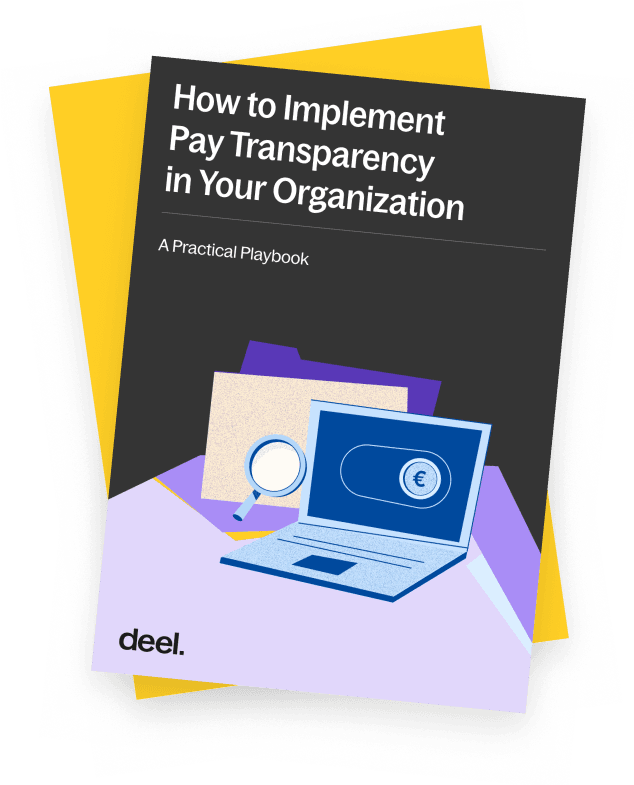Article
24 min read
10 Fair Employee Compensation Strategies For Global Teams
Global HR

Author
Jemima Owen-Jones
Last Update
June 20, 2025

Table of Contents
What are the key challenges of global compensation management?
Fair employee compensation strategies for global teams
Keep pay fair and squared away with Deel
Key takeaways
- Equitable employee pay is crucial for attracting and retaining top talent but it must be financially sustainable.
- Global companies may find it challenging to develop fair compensation policies that account for complex international laws, diverse needs, and fluctuating currencies.
- Consider offering perks and non-compensatory benefits to further support a diverse workforce's needs.
Only one in three workers believe they have equitable pay. As doubts over salary can negatively impact workplace culture, it’s no wonder that 72% of businesses have made fair employee compensation strategies a top priority.
However, compensation management is a precarious balancing act. If you overestimate salaries, you risk creating unsustainable financial commitments that affect your company’s bottom line. Global enterprises have the added challenge of setting fair pay while considering diverse legal requirements, varied cost of living, and currency fluctuations.
Our guide shows you how to set salaries that reflect your team’s value while making the most of global mobility and ensuring compliance. Continue reading to discover 10 proven strategies to implement fair global compensation.
What are the key challenges of global compensation management?
Developing an equitable employee compensation plan for global teams presents several financial, strategic, and cultural challenges.
The core issue is ensuring your strategy is financially viable. If you don’t offer competitive pay, you’ll struggle to attract and retain your best employees. However, unsustainable pay practices can lead to reduced profitability, budgetary constraints, and ultimately, tough cost-cutting decisions.
Distributed companies also have to factor international hiring trends into their decision-making. A global mobility team has to consider:
- Cost of living: Employees in different countries require varying amounts of money to cover basic needs like rent, utilities, and food. To give you an idea of the range, a one-bedroom apartment is around $2,700 (USD) in London, $1,200 in Madrid, and just $500 in Sofia
- Cost of labor: The average wages for positions, both in specific regions and the global job market, will dictate your candidates’ expectations
- Currency fluctuations: Compensation must account for changes in the exchange rate to ensure workers have a fair and stable income
- Local laws: Many jurisdictions have rules and regulations around employment. Staying compliant with them is crucial to avoiding harsh penalties and costly lawsuits
Compensation isn’t just a question of finance, though. A great strategy reflects your complex company culture and values while meeting the diverse needs and wants of a global workforce.
For example, you have to consider which types of compensation employees would most benefit from, both direct and indirect. Some jurisdictions, like the UK and Canada, have universal healthcare systems, so workers there may not appreciate extensive medical benefits.
Compensation With Deel HR
Fair employee compensation strategies for global teams
Although developing fair compensation strategies for international teams can be challenging, it’s not insurmountable. Deel has helped many companies to go remote and hire worldwide successfully.
Using the following strategies, you can even make compensation an integral part of your global mobility strategy. You’ll find you can leverage factors like low cost of living or local benefits to offer lucrative remote work policies that benefit you and your employees.
1. Using international compliance to set pay parameters
Many jurisdictions have their own guidelines on equitable pay for employees. Before you determine salaries, ensure your organization meets these standards.
In particular, countries often have laws concerning pay parity and anti-discrimination. You could receive a penalty if you can’t justify why staff in similar roles receive different compensation. For example, under the Equal Pay Act, US employers risk fines of up to $10,000 for inequitable pay practices.
Global companies may be unclear about which regulations apply to their employees. Seeking expert legal advice from solutions like Deel can help you navigate complex labor laws and stay compliant no matter where you hire from. We have specialist teams with in-depth knowledge of local and international regulations in over 100 countries.
2. Collecting the right job market data
When looking at research to set salaries, it’s best to take a holistic approach to data analysis. Otherwise, you’ll risk basing your decisions on misleading information. Stephanie Tigor offered the following example during Deel’s Global Hiring Summit:
Oftentimes, people conflate the cost of living with the cost of labor. For example, the cost of living in Zurich is about 13% higher than the cost of living in San Francisco. Folks see facts like these and think that means in designing their global compensation strategy, Zurich should be paid 113% of what San Francisco is. But the cost of living isn’t directly correlated one-to-one with the cost of labor. If we look at what people get paid in each region, we’ll see that Switzerland actually gets paid less than the San Francisco area. So, if we were to use the cost of living here to set compensation and hire in Zurich, we’d overpay by about 40%.
—Stephanie Tigor,
Head of Data, Pave
Here’s a list of the market research you should conduct when deciding pay scales for each role:
- Cost of living: Check government websites, economic reports, or crowd-sourced sites for an idea of local expenses. For example, Numbeo allows you to compare cities and view costs in different currencies
- Local cost of labor: Use tools like Deel’s Salary Insights feature to gauge how much workers expect to be paid in your desired locations
- Global cost of labor: Look at job adverts for fully remote roles to get an idea of the overall average
- Economic indicators: Track inflation and stability across key hiring locations using sites like World Bank or Eurostat
- Tax rates and mandatory contributions: Check whether you need to raise compensation packages to account for high income tax or social security payments
- Supply and demand for talent: Read industry reports and government surveys to discover local and global trends in hiring for specific roles
Global Hiring Toolkit
3. Balancing localization with standardization
Once you have all the data, you have to decide how deeply you want to match your pay ranges to global or local standards. There are four main approaches to choose from. Consider your context as what works for one company might not work for another.
- Location: Base compensation on where team members live at the time of hiring. This approach is best for organizations with a diverse workforce where the cost of living varies significantly
- Headquarters: Calculate pay based on market rates in your organization’s region. Using a primary location is most suitable for small businesses with little diversity and a strong presence in one country
- Global trends: Choose salary ranges according to international trends. You’ll find this approach most ideal if you operate in an industry like finance or tech, which is subject to global standards and requires competitive compensation
- Benchmarks: Find the global or national benchmark for a role and adjust it on an individual level. This approach is useful if you have an equally strong domestic and international presence
4. Navigating currency and exchange rate fluctuations
Exchange rates can affect how well each employee’s paycheck covers their expenses.
Let’s say your employee makes $2500 per month but the currency value frequently fluctuates by 3 to 5%. One month they might make $2,425 and another they could make $2,375. If they’re on a tight budget, these differences could impact their lifestyle.
Calculate the rolling average from regular checks to find the most solid basis for salaries. Monitoring in real-time won’t yield meaningful data as currency fluctuations can be erratic—aim for around every 30 days instead.
—Stephanie Tigor,
Head of Data, Pave
5. Establishing a compensation philosophy with clear policies
With all your research, you can create a compensation framework to keep pay consistent. Decide the value of each role at your organization and set the expected salaries. When considering the pay range, you can base the parameters on location alongside job title, qualifications, and years of experience.
Let’s say your company has teams in the US, UK, and Germany. You want to set a pay range for a project engineer so you look at the cost of labor in each country. You get the following results from the Deel Salary Insights tool:
- US: $88,000 to $115,000 with a median of $93,000
- UK: $60,000 to $106,000 with a median of $106,000
- Germany: $65,000 to $106,000 with a median of $86,000
Use the lowest and highest numbers as your starting point for deciding the salary range. Here, that’s $60,000 to $115,000. You can refine your numbers by deciding, for example, you won’t go below the median or you want to be in the top 10 percentile for the industry.

What if employees move between countries and create disparities in pay? Implementing relocation policies can help you maintain consistency. For example, you can request approval for permanent moves or offer a separate stipend for employees living in high COL regions.
💡 Deel’s guide to relocating employees can give you more in-depth advice about creating policies with advice on eligibility, support, and procedures.
6. Considering benefits for diverse worker needs
Total compensation goes beyond base pay to include bonuses and benefits. That’s why it’s essential to provide inclusive packages to remain equitable. If you offer perks based on one location, you could disadvantage some employees.
Take travel for example: British people often walk, cycle, or drive to work whereas Japanese people depend on high-cost public transport. If your company offers everyone a generous travel stipend, some UK employees may feel frustrated they can’t use it.
Consider what your people need overall and offer personal allowances to bridge gaps. If employees have a monthly stipend, they can choose what they need whether that’s a travel pass, powerful internet, or meditation sessions.
Global Hiring Toolkit
Solutions like Deel can help you administer global employee benefits that meet individual needs. We’ve partnered with top-tier providers around the world including health insurance, worker’s compensation, and retirement plans. Our team of experts can help you source the best deals from each region and keep you compliant with local regulations like the Consolidated Omnibus Budget Reconciliation Act (COBRA) and Family and Medical Leave Act (FMLA) in the US.
7. Incorporating pay equity into compensation packages
Including stock options or equity in your benefits package can help distributed teams share in the success of the company. When your business thrives and its value increases, all staff benefit regardless of their location. The reverse is also true—you can use stock options to reward employees when you have a tight budget that prevents you from offering higher base salaries.
Employee stock ownership plans (ESOP) can have a significant impact on job satisfaction—a recent study found companies with these programs had a retention rate 14.7% higher than those that didn’t.
Similar to direct compensation, countries often have rules and regulations surrounding employee equity. Many jurisdictions treat stock options as taxable income. For instance, Internal Revenue Service (IRS) guidelines require US workers to pay capital gains tax and file a report for some sales of stock options.
Use Deel to offer equity to employer of record (EOR) employees. The specialized equity team has 30+ years of expertise in more than 90 countries, helping companies decide on equity types, process grants, take care of taxable events, and support specific technical questions. Deel syncs with equity systems and automatically calculates and withholds equity-related taxes in payroll.
8. Leveraging the best HR solutions
Using payroll and HR technology like Deel ensures there are no significant differences between how and when different teams receive their paycheck. We let you run payroll in over 100 countries so payments are on time and with the right tax withholding. All workers, whether they’re employees or contractors, can also log in to check their earnings.
Payroll matters because team members should have equal flexibility and control over their pay. If one team keeps receiving their paycheck late and frequently encounters issues and errors, they’ll find it harder to manage their personal finances.
Solutions like Deel also have access to a wide range of tools and resources they can share with you. We have qualified experts in legal and accounting across many jurisdictions as well as employment and compensation data. For instance, Deel can help you set up global mobility and remote-first strategies as you expand abroad.
9. Keeping clear communication about compensation strategies
Giving every team the relevant information empowers them to make more informed choices about their pay. For example, they can see all the benefits or relocation options available to them.
Employees can also understand why there may be differences in compensation. This increased transparency will reinforce their trust in the company and increase overall satisfaction. You could attract more top talent as 82% of job seekers say they’re more likely to apply for a company that discloses pay in the job description.
Communicate your compensation strategies to new hires during the onboarding phase. You can include all your policies in your employee handbook and on the company intranet. Giving simple, jargon-free explanations with multiple translations will ensure your policies are accessible regardless of each employee’s nationality or financial background.
When necessary, make company-wide updates using your internal messenger or email. You can explain the rationale for changing your compensation strategy and avoid any confusion. And for maximum impact, create learning courses for managers and employees to ensure everybody is on the same page.

10. Regularly reviewing and adjusting compensation strategies
As your organization evolves, your compensation strategies need to change. You may also find countries you operate in introduce new labor laws or eliminate old ones. That’s why it’s crucial to continuously monitor and adjust your compensation management.
Collecting feedback from employees allows you to identify areas for improvement. Your teams are often best placed to notice issues like inequities, suboptimal processes, or redundant benefits packages. Given that pay can be a sensitive topic, it’s best to request feedback via an anonymous survey.
You can also measure key finance, accounting, and human resource metrics like:
- Productivity
- Profitability
- Employee engagement
- Retention
- Time to run payroll
- Benefits adoption rates
By tracking data, you’ll notice trends and patterns that indicate whether your compensation strategies are successful. You can see, for example, whether hires in a new country use your current incentives or request new ones. If you implement the changes, you should see the impact on their job satisfaction.

Keep pay fair and squared away with Deel
Fair compensation strategies not only allow you to acknowledge your team’s value but also meet their diverse needs. They encompass everything from salaries and bonuses to benefits packages and payroll.
With the right policies in place, you can also attract and retain employees from all over the world without affecting your budget for expansion. You’ll find pay practices that reflect each employee’s worth while avoiding compliance issues or overpaying on salaries.
Deel is a holistic payroll and HR platform that provides everything a company needs to plan their compensation—direct and indirect. Deel simplifies the complexities of compensation design, administration, and implementation, empowering your business to:
- Transform global compensation design and management with tailored dashboards and real-time insights to optimize your compensation strategy
- Incentivize your workforce through innovative and easy-to-manage equity-granting solutions
- Create benefits plans—follow our step-by-step plan builder to design the prices, deductibles, contributions, and eligibility for any benefit you offer to your workforce
- Process payroll globally for contractors and employees, allowing you to handle tax, compliance, and filings seamlessly in any location
- Manage worker information and operations effortlessly with our built-in HRIS solution, regardless of worker type—use it to track PTO, paid leaves, and more
Book a demo to see how Deel can help you design and manage effective, equitable compensation strategies and structures across your global workforce.

Global salary insights on Deel

Jemima is a nomadic writer, journalist, and digital marketer with a decade of experience crafting compelling B2B content for a global audience. She is a strong advocate for equal opportunities and is dedicated to shaping the future of work. At Deel, she specializes in thought-leadership content covering global mobility, cross-border compliance, and workplace culture topics.

















